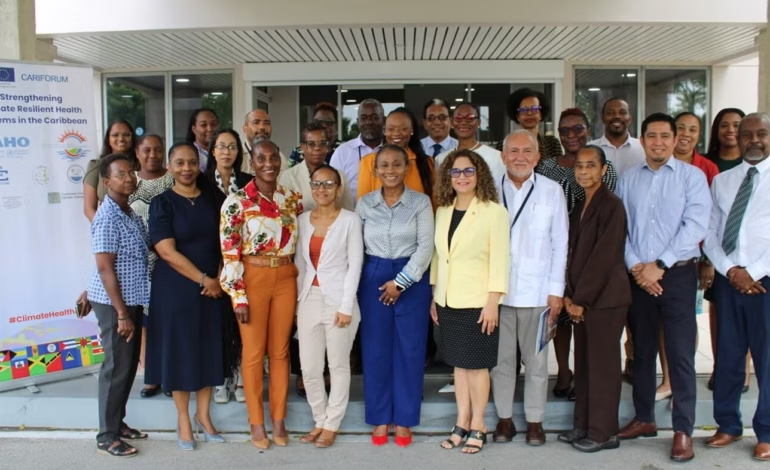
Bridgetown, Barbados, 6 June, 2025 (PAHO/WHO) – Stakeholders from Barbados’ health sector, disaster management, Prime Minister’s Office, the University of the West Indies and the Caribbean Community Climate Change Centre, met from June 3-4 at the Pan American Health Organisation, to validate the Barbados Health National Adaptation Plan (HNAP), a blueprint for building a more climate-resilient health system.
The HNAP identifies health strategic adaptation priorities, objectives, and action items, and is one output of the PAHO-coordinated EU/CARIFORUM Strengthening Climate-Resilient Health Systems in the Caribbean project. The HNAP will address the challenges for the health sector resulting from the impacts of climate change, outlined PAHO/WHO Representative for Barbados and the Eastern Caribbean Countries, Dr Amalia Del Riego.
“By integrating climate adaptation into health planning, we not only safeguard communities from climate-related health risks but also advance universal health coverage, equity, and sustainable development. This workshop is a vital opportunity to ensure that our strategies are inclusive, evidence-based, and aligned with global and regional commitments to build healthier, more resilient societies,” Dr Del Riego noted.
Barbados’ Chief Medical Officer, Dr. The Most Honourable Kenneth George, described the progress made in developing the plan. “The HNAP represents our roadmap. It outlines evidence-based strategies to strengthen our health system, reduce vulnerability and build resilience, particularly among our most at-risk populations and to support essential services,” Dr George remarked.
The Ministry of Health and Wellness, with the support of PAHO and the Caribbean Community Climate Change Centre (CCCCC), will develop a concept note for mobilizing climate and health financing based on the priorities outlined in the HNAP. Luca Trinchieri, Team Leader for the Green Deal Partnership with the Caribbean at the EU Delegation to Barbados, Eastern Caribbean and CARICOM/CARIFORUM, highlighted this as a valuable exercise. “This concept note aims to secure crucial financing that will help implement the HNAP effectively, enabling Barbados to build a climate-resilient health system and protect its communities. Today’s validation workshop marks a significant step in this journey. It brings together the voices of those who will help bring this plan to life — health professionals, government leaders, community representatives, and technical experts. The EU remains committed to working alongside Barbados and our regional partners to support sustainable, inclusive, and climate-resilient development,” Mr Trinchieri pointed out.
“With over 80 targeted action items, a budgeted implementation framework, and a dedicated monitoring and evaluation system, the HNAP is more than a plan – it is a call to action. And through the development of the accompanying Concept Note, we aim to mobilize the financial and technical resources needed to operationalize this vision and deliver measurable impact where it is most needed,” pointed out Interim PAHO Subregional Program Director, Caribbean, Dr Juan Manuel Sotelo.
In addition to Barbados, Saint Lucia, Grenada, the Bahamas, Jamaica, Belize, Haiti, Guyana, Dominican Republic and St. Vincent and the Grenadines have received technical support from PAHO, through funding from the EU project, to develop their HNAPs. Grenada is finalizing its concept note and Bahamas and Trinidad & Tobago have already submitted to the Green Climate Fund (GCF).
Over the past five years, PAHO has played an integral role in the development of HNAPs for 10 Caribbean Member States by facilitating multisectoral engagement, providing technical guidance and financial support. This sustained collaboration underscores PAHO’s commitment to ensuring that the HNAPs reflect national realities while strengthening resilient health systems in the face of climate change.
At the 61st Directing Council, PAHO Member States approved a new policy on health, climate change, and equity to strengthen the health sector, improve climate change adaptation and mitigation, ensure the participation of vulnerable communities, and optimize surveillance systems, as well as increase climate and health financing. The policy comes in the context that the Region of the Americas is “one of the most vulnerable due to its susceptibility to extreme weather events, economies that depend on climate-sensitive sectors and high levels of social inequality,” the document states.



